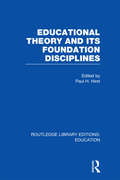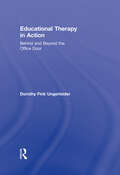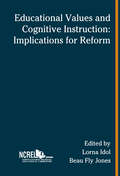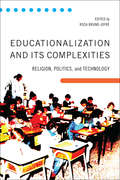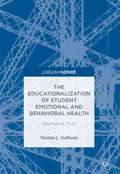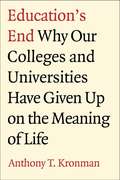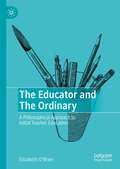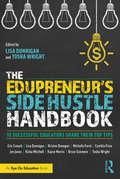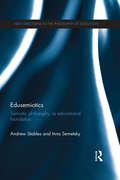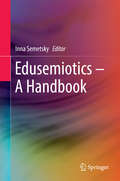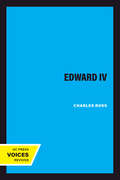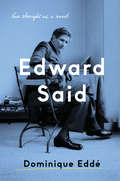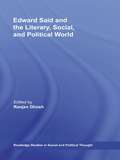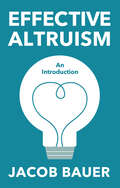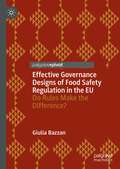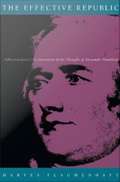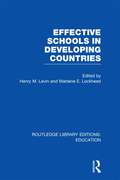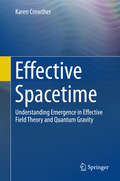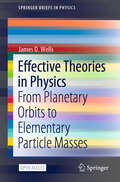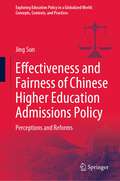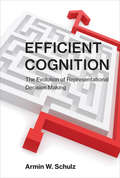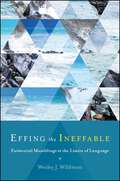- Table View
- List View
Educational Theory and Its Foundation Disciplines (Routledge Library Editions: Education)
by Paul H. HirstAt the time this book was first published the disciplines of philosophy of education, educational psychology, sociology of education and the history of education had developed rapidly. The papers in this volume outline the developments that took place. The first paper analyses the nature of a theory concerned with determining practice and the place of academic disciplines within that. What emerges is the crucial role of these disciplines, but also the need to develop much more adequately a domain of practical principles, assessed and critically reformulated in the light of those disciplines. The following papers are concerned with the contributions four of those disciplines are now making.
Educational Therapy in Action: Behind and Beyond the Office Door
by Dorothy Fink UngerleiderThis book provides an in-depth look at what a little-known clinician, the educational therapist, does and how they do it. It goes behind the clinician’s door to illustrate the unusual and broad range of interventions – both academic/vocational and social/emotional – that an educational therapist employs. This particular case study involves a young woman named Nora who had a severe but undiagnosed auditory processing disorder. She could not give meaning to the spoken language that came at her too rapidly, leaving her in a constant fog of words that she couldn’t comprehend. This case discloses the problems, their causes, and the emotional toll that had to be considered when developing an effective educational/therapeutic plan for Nora. It vividly illustrates the dynamic exchanges and mutual learning that goes on between client and therapist. Parts I and II illustrate how the psycho-educational interventions that addressed Nora’s academic and non-academic needs were gradually formulated over the first year. Part III provides a series of vignettes from subsequent years that illustrate the ongoing applications of the therapist’s work. Distinguishing Features Explanatory Sidebars – The rationale behind particular techniques and interventions is clarified through a system of explanatory sidebars that inform the reader without distracting from the story. This approach makes the book both an instructional tool well as compelling story. Organic Curriculum – The rationale for and application of an "organic (personalized) curriculum" is explained and applied throughout the book as a model for others to use in working with this population. A Longitudinal Perspective – The initial work with Nora began many years ago, so this book provides a long view of her life and tracks the influences that educational therapy exerted on her development into a fully functioning adult. Cognitive/Emotional Integration – The core of educational therapy – the interdependence of cognitive skills and emotional response – is clearly documented throughout the book. In addition to educational therapy students and practitioners, this book is appropriate for those working in related fields such as special education, school psychology, school counselling, and social work in educational settings.
Educational Values and Cognitive Instruction: Implications for Reform
by Lorna Idol Beau Fly JonesThis volume is a comprehensive guide to state-of-the-art research on thinking, cognitive instruction, social values, and reform. Cognitive instruction for at-risk students is discussed in great detail along with a thorough examination of the teaching of thinking skills from the viewpoint of educational values and school culture. The issues of thinking, learning, and cognitive instruction are linked to the educational reform movement from numerous perspectives. Specifically, the reader can better anticipate which aspects of research on thinking will conflict with existing paradigms and which aspects of schooling will be most resistant to change.
Educationalization and Its Complexities: Religion, Politics, and Technology
by Rosa Bruno-JofréThis edited collection brings together scholars from Canadian and international institutions to discuss educationalization, a trend in modern societies that involves transferring social responsibilities onto the school system. This book brings a new dimension to the literature on educationalization by examining the concept in relation to Catholicism, Indigenous issues, the right to education, and historical studies grounded in both Canada and Chile. In these contributions, the book represents an attempt to both deepen the current discussion on the construction and use of educationalization as a concept as well as invite further exploration of this subject in relation to the increasing digitalization of life in the twenty-first century.
The Educationalization of Student Emotional and Behavioral Health: Alternative Truth
by Teresa L. SullivanThis book examines the current political, social, and economic positions that push the responsibility for the emotional health of students onto schools. The context of recent education reform asks schools to mitigate adverse emotional health of students by developing and implementing broad programming, curriculum, and policies immersed in cognitive behavioral approaches. The design plan is intended to build resilience and develop strategies in students that will enable them to succeed despite adverse structural conditions. The swindle of education reform is that it deflects and blames families, youth, and the school system for the social ills of society. From the perspective of a thirty year Massachusetts educator and high school principal emerges an alternative reality that not only challenges decades of education reform entrenched in victim blaming but also exposes a serious responsibility gap.
Education's End: Why Our Colleges and Universities Have Given Up on the Meaning of Life
by Anthony T. KronmanThe question of what living is for-of what one should care about and why-is the most important question a person can ask. Yet under the influence of the modern research ideal, our colleges and universities have expelled this question from their classrooms, judging it unfit for organized study. In this eloquent and carefully considered book, Tony Kronman explores why this has happened and calls for the restoration of life's most important question to an honored place in higher education. The author contrasts an earlier era in American education, when the question of the meaning of life was at the center of instruction, with our own times, when this question has been largely abandoned by college and university teachers. In particular, teachers of the humanities, who once felt a special responsibility to guide their students in exploring the question of what living is for, have lost confidence in their authority to do so. And they have lost sight of the question itself in the blinding fog of political correctness that has dominated their disciplines for the past forty years. Yet Kronman sees a readiness for change--a longing among teachers as well as students to engage questions of ultimate meaning. He urges a revival of the humanities' lost tradition of studying the meaning of life through the careful but critical reading of great works of literary and philosophical imagination. And he offers here the charter document of that revival.
The Educator and The Ordinary: A Philosophical Approach to Initial Teacher Education
by Elizabeth O'BrienThis book creates a unique discursive environment to consider how initial teacher education can support student teachers in practical and personal senses, in what they can do and who they are. What is it to care? To develop our voice? To educate in beautifully risky ways? Engaging with the philosophy of Stanley Cavell, Gert Biesta and Nel Noddings, central capabilities of the educator are suggested: Acknowledgement, Autobiography, Imagination, Interruption, Attention and Uncertainty, culminating in the essential, unifying capability of The Ordinary, underpinned by Complexity and Hope.This book will appeal to those interested and engaged in initial teacher education, professional development and support from early years to higher education and practicing educators. It aims to enrich theoretical as well as practical discussion, to influence how we live, how we think, and how we treat each other.
The Edupreneur's Side Hustle Handbook: 10 Successful Educators Share Their Top Tips
by Lisa Dunnigan Tosha WrightFind out how you can use your talents as an educator to make extra money on the side! In this helpful book, top Instagram influencers share how they’ve had success with selling lesson plans, handouts, t-shirts, and more, while maintaining careers as teachers and school leaders. You’ll hear from these inspiring educators: Lisa Dunnigan and Tosha Wright @thewrightstuffchics Jen Jones @hellojenjones Michelle Ferré @pocketfulofprimary Kisha Mitchell @sweetteaandsunshinepodcast Bryce Sizemore @theteachingtexan Kristen Donegan @easyteachingtools Cynthia Frias @followsocialone Kayse Morris @kaysemorris Eric Crouch @adventureswithmrc If you’ve always dreamed of having a side hustle but weren’t sure you had the time or the know-how, this is the book for you. Each chapter offers tons of practical tips to help you get started, along with humorous anecdotes and words of wisdom to keep you motivated on your journey.
Edusemiotics: Semiotic philosophy as educational foundation (New Directions in the Philosophy of Education #64)
by Inna Semetsky Andrew StablesEdusemiotics addresses an emerging field of inquiry, educational semiotics, as a philosophy of and for education. Using "sign" as a unit of analysis, educational semiotics amalgamates philosophy, educational theory and semiotics. Edusemiotics draws on the intellectual legacy of such philosophers as John Dewey, Charles Sanders Peirce, Gilles Deleuze and others across Anglo-American and continental traditions. This volume investigates the specifics of semiotic knowledge structures and processes, exploring current dilemmas and debates regarding self-identity, learning, transformative and lifelong education, leadership and policy-making, and interrogating an important premise that still haunts contemporary educational philosophy: Cartesian dualism. In defiance of substance dualism and the fragmentation of knowledge that still inform education, the book offers a unifying paradigm for education as edusemiotics and emphasises ethical education in compliance with the semiotic unity between knowledge and action. Chapters contain accessible discussions in the context of educational philosophy and theory, crossing the borders between logic, art, and science together with a provocative theoretical critique. Recently awarded a PESA book award for its contribution to the philosophy of education, Edusemiotics will appeal to an academic readership in education, philosophy and cultural studies, while also being an inspiring resource for students.
Edusemiotics – A Handbook
by Inna SemetskyEdusemiotics is a pioneering area of study that connects semiotics - the science of signs - with educational theory and the philosophy of education. This volume reflects cutting-edge research by scholars in education and in semiotics worldwide, bridging the two discourses to present the state of the art in this new transdisciplinary field. The book's emphasis is on educational theory as based on semiotic philosophy: as such, it challenges the current conception of semiotics in education as merely a sub-branch of applied semiotics. It presents edusemiotics as a novel unified conceptual framework at the interface of theoretical semiotics and educational philosophy, based on both theoretical and empirical studies from around the world. The chapters in this handbook also bring to the fore the intellectual legacy of Charles S. Peirce, John Dewey, Gilles Deleuze, Umberto Eco, Julia Kristeva, Mikhail Bakhtin, Paul Ricoeur, Martin Heidegger and other thinkers, pointing out the implications of edusemiotics for meaningful pedagogy and experiential learning in diverse contexts.
Edward IV
by Charles RossThis title is part of UC Press's Voices Revived program, which commemorates University of California Press’s mission to seek out and cultivate the brightest minds and give them voice, reach, and impact. Drawing on a backlist dating to 1893, Voices Revived makes high-quality, peer-reviewed scholarship accessible once again using print-on-demand technology. This title was originally published in 1974.
Edward Said: His Thought as a Novel
by Dominique EddeAn intimate account of Edward Saïd's life and thoughtEdward Said is a personal, literary portrait of one of the twentieth century’s most influential scholars, written by his close friend and confidante. Here, Lebanese novelist and essayist Dominique Eddé offers a fascinating and fresh presentation of his oeuvre from his earliest writings on Joseph Conrad to his most famous texts, Orientalism and Culture and Imperialism. Eddé weaves together accounts of the genesis and content of Said’s work, his intellectual development, and her own reflections and personal recollections of their friendship, which began in 1979 and lasted until Said’s death in 2003. In this intimate and searching portrait of Said’s thought, Eddé continues to maintain their dialogue despite his death, trying to make peace with the loss of a collaborator with whom she still wants to talk and disagree.Bringing together personal reflection and theoretical innovation, reflective mourning and immediate argument, Eddé has written a testament to a great intellectual passion.Both specialists of Said’s work and newcomers will find much to learn in this rich portrait of one of the twentieth century’s most important intellectuals.
Edward Said and the Literary, Social, and Political World (Routledge Studies in Social and Political Thought)
by Ranjan GhoshEdward Said is widely recognized for his work as a critic and theorist of Orientalism and the Palestine crisis, but far less attention has been devoted to his considerable body of literary and cultural criticism. In this edited collection, the contributors - many among the foremost Said scholars in the world - examine Said as the literary critic; his relationship to other major contemporary thinkers (including Derrida, Ricoeur, Barthes and Bloom); and his involvement with major movements and concerns of his time (such as music, Feminism, New Humanism, and Marxism). Featuring freshly carved out essays on new areas of intervention, the volume is an indispensable addition for those interested in Edward Said and the many areas in which his legacy looms.
Effective Altruism: An Introduction
by Jacob BauerAs the world faces increasingly complex problems – from pandemics to global poverty and climate change – how do we decide where to concentrate our efforts and resources to do the most good possible? Effective altruism offers a way to do just that, focusing on evidence and rational arguments to identify crucial issues and the most impactful ways of solving them. In this new book, philosopher Jacob Bauer cuts through the uncritical hype and wholesale dismissal around effective altruism to offer a balanced overview of this movement’s core concepts and approaches to “doing good better.” With examples spanning malaria-preventing bed nets to the dangers of AI, he illuminates how effective altruism is addressing some of the world’s most pressing problems, all the while acknowledging its real limitations and showcasing its immense promise. Whether you are a skeptic or a new adherent seeking to understand the philosophy and community of effective altruism, this book is the definitive guide.
Effective Governance Designs of Food Safety Regulation in the EU: Do Rules Make the Difference?
by Giulia BazzanThis book provides insights on regulatory effectiveness in the field of food safety, by focusing on the variety of institutional factors affecting regulatory outcomes. Drawing upon the Institutional Analysis and Development framework, it investigates differences in effectiveness of food safety regulation and explains them by differences in domestic governance designs, by applying Qualitative Comparative Analysis. The empirical focus of the book is the food safety governance designs of 15 EU Member States, which are investigated through the collection of an original dataset inclusive of measures of independence and accountability of the domestic food safety agencies, of policy capacity and of food safety delivered. The results show the prominent role of the institutional dimension of policy capacity in producing regulatory effectiveness, in conjunction with an integrated model of distribution of the regulatory tasks. As to ineffective governance, the conjunction of low independence or low accountability with low institutional capacity produce ineffective responses.
Effective Kan Fibrations in Simplicial Sets (Lecture Notes in Mathematics #2321)
by Benno van den Berg Eric FaberThis book introduces the notion of an effective Kan fibration, a new mathematical structure which can be used to study simplicial homotopy theory. The main motivation is to make simplicial homotopy theory suitable for homotopy type theory. Effective Kan fibrations are maps of simplicial sets equipped with a structured collection of chosen lifts that satisfy certain non-trivial properties. Here it is revealed that fundamental properties of ordinary Kan fibrations can be extended to explicit constructions on effective Kan fibrations. In particular, a constructive (explicit) proof is given that effective Kan fibrations are stable under push forward, or fibred exponentials. Further, it is shown that effective Kan fibrations are local, or completely determined by their fibres above representables, and the maps which can be equipped with the structure of an effective Kan fibration are precisely the ordinary Kan fibrations. Hence implicitly, both notions still describe the same homotopy theory. These new results solve an open problem in homotopy type theory and provide the first step toward giving a constructive account of Voevodsky’s model of univalent type theory in simplicial sets.
Effective Mathematics of the Uncountable
by Noam Greenberg Joel David Hamkins Denis Hirschfeldt Russell MillerClassical computable model theory is most naturally concerned with countable domains. There are, however, several methods - some old, some new - that have extended its basic concepts to uncountable structures. Unlike in the classical case, however, no single dominant approach has emerged, and different methods reveal different aspects of the computable content of uncountable mathematics. This book contains introductions to eight major approaches to computable uncountable mathematics: descriptive set theory; infinite time Turing machines; Blum-Shub-Smale computability; Sigma-definability; computability theory on admissible ordinals; E-recursion theory; local computability; and uncountable reverse mathematics. This book provides an authoritative and multifaceted introduction to this exciting new area of research that is still in its early stages. It is ideal as both an introductory text for graduate and advanced undergraduate students, and a source of interesting new approaches for researchers in computability theory and related areas.
The Effective Republic: Administration and Constitution in the Thought of Alexander Hamilton
by Harvey FlaumenhaftThe United States has been distinguished among free governments as a "presidential" republic. In The Effective Republic, Harvey Flaumenhaft shows how the study of Alexander Hamilton's political thought opens the way to understanding the nature of this republic and the reasons for its development. Although Hamilton exterted an extraordinary influence on American institutions, his contribution and the thinking behind it often have been obscured and misconstrued by piecemeal approaches to his voluminous writings. Here, Flaumenhaft draws upon more than two dozen volumes of Hamilton's papers to produce a comprehensive account of his thought on the principles of politics--the account which Hamilton himself hoped to give in a multivolume treatise, but died before producing. Beginning with a discussion of the place of general principles in Hamilton's thought, The Effective Republic proceeds to his views on popular representation as a safeguard of individual liberty. Flaumenhaft then elaborates on Hamilton's thinking about efficacious administration, especially how the President and Senate meet the requirements of unity and duration in a republic, and on the importance of an independent judiciary for constitutional integrity. What emerges clearly as Hamilton's chief concern is the need to make government not only safe but effective--hindered from doing harm by its popular base, but also, through the differentiation of administrative powers and tasks, capable of doing good. Interpreting, linking, and, and arranging Hamilton's words, Flaumenhaft allows Hamilton to speak for himself, to explain his benificiaries his vision of what the republican experiment needed in order to succeed.
Effective Schools in Developing Countries (Routledge Library Editions: Education #Vol. 15)
by Henry M. LevinThis volume brings together eight case studies which describe a variety of initiatives to create more effective schools for children of poverty, especially in the Third World. The initiatives reviewed published and unpublished documents and both qualitative and statistical studies were examined. Countries include Brazil, Burundi, Colombia, Ghana, Nepal, Sri Lanka, Thailand and the United States. Each initiative was developed independently to address unique challenges and situations but taken as a group, the features of the approaches described in this volume can be viewed as a basis for considering the development of effective schools strategies in other contexts.
Effective Spacetime
by Karen CrowtherThis book discusses the notion that quantum gravity may represent the "breakdown" of spacetime at extremely high energy scales. If spacetime does not exist at the fundamental level, then it has to be considered "emergent", in other words an effective structure, valid at low energy scales. The author develops a conception of emergence appropriate to effective theories in physics, and shows how it applies (or could apply) in various approaches to quantum gravity, including condensed matter approaches, discrete approaches, and loop quantum gravity.
Effective Theories in Physics
by James D. WellsThere is significant interest in the Philosophy of Science community to understand the role that "effective theories" have in the work of forefront science. The ideas of effective theories have been implicit in science for a long time, but have only been articulated well in the last few decades. Since Wilson's renormalization group revolution in the early 1970's, the science community has come to more fully understand its power, and by the mid-1990's it had gained its apotheosis. It is still one of the most powerful concepts in science, which has direct impact in how one thinks about and formulates theories of nature. It is this power that this Brief sets out to emphasize through historical analysis and current examples.
Effective Theories in Physics: From Planetary Orbits to Elementary Particle Masses (SpringerBriefs in Physics)
by James D. WellsThis open access book…There is significant interest in the Philosophy of Science community to understand the role that "effective theories" have in the work of forefront science. The ideas of effective theories have been implicit in science for a long time, but have only been articulated well in the last few decades. Since Wilson's renormalization group revolution in the early 1970's, the science community has come to more fully understand its power, and by the mid-1990's it had gained its apotheosis. It is still one of the most powerful concepts in science, which has direct impact in how one thinks about and formulates theories of nature. It is this power that this Brief sets out to emphasize through historical analysis and current examples.This is an open access book.
Effectiveness and Fairness of Chinese Higher Education Admissions Policy: Perceptions and Reforms (Exploring Education Policy in a Globalized World: Concepts, Contexts, and Practices)
by Jing SunThis book explores effectiveness and fairness in higher education admissions policy. It reviews the literatures from the 1940s until the 2010s and provides a theoretical framework. The book explores comparisons between this framework and the empirical data by interviewing policymakers from the Chinese government as well as admissions officer at Chinese universities. The book contributes to providing underlying theoretical foundation on the future Chinese higher education admissions policy reform. This book appeals to policymakers on all level of education, practitioners of admissions policy, researchers on education policy, and anyone who is interested in this field.
Efficient Cognition: The Evolution of Representational Decision Making
by Armin W. SchulzAn argument that representational decision making is more cognitively efficient, allowing an organism to adjust more easily to changes in the environment. Many organisms (including humans) make decisions by relying on mental representations. Not simply a reaction triggered by perception, representational decision making employs high-level, non-perceptual mental states with content to manage interactions with the environment. A person making a decision based on mental representations, for example, takes a step back from her perceptions at the time to assess the nature of the world she lives in. But why would organisms rely on representational decision making, and what evolutionary benefits does this reliance provide to the decision maker? In Efficient Cognition, Armin Schulz argues that representational decision making can be more cognitively efficient than non-representational decision making. Specifically, he shows that a key driver in the evolution of representational decision making is that mental representations can enable an organism to save cognitive resources and adjust more efficiently to changed environments. After laying out the foundations of his argument—clarifying the central questions, the characterization of representational decision making, and the relevance of an evidential form of evolutionary psychology—Schulz presents his account of the evolution of representational decision making and critically considers some of the existing accounts of the subject. He then applies his account to three open questions concerning the nature of representational decision making: the extendedness of decision making, and when we should expect cognition to extend into the environment; the specialization of decision making and the use of simple heuristics; and the psychological sources of altruistic behaviors.
Effing the Ineffable: Existential Mumblings at the Limits of Language
by Wesley J. WildmanIn Effing the Ineffable, Wesley J. Wildman confronts the human obsession with ultimate reality and our desire to conceive and speak of this reality through religious language, despite the seeming impossibility of doing so. Each chapter is a meditative essay on an aspect of life that, for most people, is fraught with special spiritual significance: dreaming, suffering, creating, slipping, balancing, eclipsing, loneliness, intensity, and bliss. These moments can inspire religious questioning and commitment, and, in extreme situations, drive us in search of ways to express what matters most to us. Drawing upon American pragmatist, Anglo-American analytic, and Continental traditions of philosophical theology, Wildman shows how, through direct description, religious symbolism, and phenomenological experience, the language games of religion become a means to attempt, and, in some sense, to accomplish this task.
